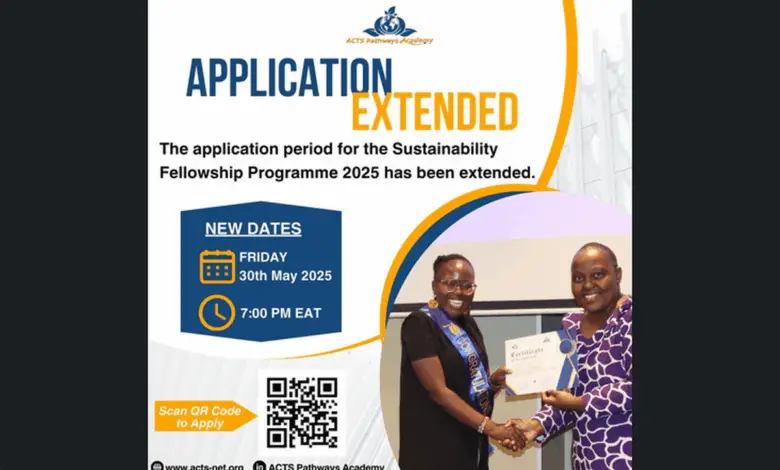Call for Applications: the 2025 APA Sustainability Fellowship Programme

Closing Date: 30 May 2025
Call for Applications: the 2025 APA Sustainability Fellowship Programme
Due to overwhelming interest, the APA Sustainability Fellowship Programme has extended its application deadline to 30th May 2025!
Theme: Integrating AI, Climate Policy, and Sustainability Research for Transformative Impact in the Global South.
Background
The need for skilled researchers in the Global South is vital for fostering sustainable development, particularly in addressing pressing issues such as climate change. Despite their rich potential, many early-career researchers in this region encounter challenges due to inadequate training, limited access to resources, and a lack of mentorship opportunities in sustainability research.
The APA Sustainability Fellowship Program (ASFP) aims to equip early-career researchers in the Global South with practical skills, thereby strengthening local capacity and resilience. By fostering leadership in climate action, the program empowers researchers to drive sustainable practices and make meaningful contributions to the fight against climate change.
With that background, the APA Sustainability Fellowship Programme calls for applications that aims:
- To empower researchers with essential practical skills in sustainability research, integrating advanced tools such as Artificial Intelligence (AI) and Intellectual Property (IP).
- To focus on pivotal themes, including the New Collective Quantified Goal (NCQG) and the Global Goal on Adaptation (GGA). These thematic pillars will guide our fellows in making meaningful contributions to global policy processes and advocacy strategies, which ACTS is currently advancing.
- To engage fellows in blue economy & climate-focused monthly webinars, case study simulations, mentorship programs, co-publishing opportunities, joint grant applications, and workshops that emphasise actionable research.
- Stimulate the fellows to generate evidence-based solutions tailored to their communities’ needs and further develop strategies for effectively communicating their findings to policymakers and stakeholders, ensuring that their research translates into real-world impact.
Structure of the ASFP
ASFP is structured around a combination of extensive networking and training opportunities. Over six months, successful fellows will engage in a comprehensive curriculum designed to enhance their skills in sustainability research, focusing on the practical applications of artificial intelligence (AI) in driving effective climate action.
In addition to participating in and organizing monthly webinars, fellows will take part in a series of targeted short courses tailored to their needs. These courses will cover essential topics such as AI applications in sustainability, advocacy, data collection and analysis, project management, intellectual property, grant writing, and publishing skills. Furthermore, they will receive lectures on effective research methodologies and best practices in data utilization.
During the fellowship, fellows will develop collaborative research proposals focusing on community-level sustainability initiatives. These proposals will be carried out under the guidance of seasoned scientific mentors, who will provide ongoing support throughout the program.
A team of advisors from the African Centre for Technology Studies will offer continuous assistance and supervision. By the end of the fellowship, participants are expected to complete one article, host virtual webinars, conduct a case study simulation to disseminate their research findings, and complete at least one joint proposal at a concluding meeting scheduled for November 2025.
Fellowship Commitments and Expectations
- Publish at least one piece in the climate change space, such as a blog, informational brief, or policy insight, to share knowledge and drive awareness.
- Dedicate a minimum of three hours per week to fellowship activities, ensuring meaningful engagement and professional growth.
- Support your small working group leaders, contributing to team coordination, research efforts, and project execution.
- Take an active role in organizing and facilitating webinars, helping to drive discussions on climate resilience and sustainability.
- Join the mentorship program as either a mentee or mentor, fostering knowledge exchange and career development.
- Lead a 30-minute case study simulation by the end of your sixth month in the fellowship, demonstrating your ability to apply knowledge in real-world contexts.
Application Requirements:
The APA Sustainability Fellowship Programme recruits Early-Career and Seasoned Researchers from diverse sectors in the Global South and North to contribute to evidence-based research, policy, and action.
Fellows serve for 6 months and become alumni, fostering ongoing mentorship and cross-learning.
To be eligible for this call, applicants must:
- Possess a Bachelor’s, Master’s, or PhD in fields such as Environmental Science, Information Technology, Intellectual Property, Sustainable Development, Public Policy and Advocacy, or related disciplines. Research interests should align with ACTS thematic areas, including ACAII, Agriculture, Food and Nutrition Security (AFNS), Climate Resilient Economies (CRE), Gender, Youth and Inclusive Development (GYID), and Science, Technology & Innovation, Knowledge and Society (STIKS).
- Exhibit a strong research focus on sustainability issues, particularly those related to the interconnected challenges of environment, society, technology, policy, and economy
- Demonstrate the ability to contribute to academic and policy publications such as journals, blogs, and working papers
- Show capability to collaborate across disciplines to tackle the complexities of sustainable development.
- Senior Researchers will be selected based on their strategic expertise and potential contributions to mentorship.
- Be able to commit to a 6-month programme requiring engagement three times a week.
Selection Criteria
Applications will be assessed in the following:
- Environmental and social commitment: Demonstrated dedication to solving climate-related and sustainability issues, with an emphasis on equity and inclusion.
- Innovation and problem-solving: Ability to develop and apply new methodologies, tools (including AI), or frameworks to address sustainability challenges.
- Leadership and collaboration: Proven or potential ability to lead teams, influence peers, and engage stakeholders across sectors.
- Equity and inclusion: Experience and awareness of social equity in research or practice, with a particular focus on underrepresented groups.
- Communication skills: Clarity in articulating research goals, findings, and societal impact to academic and non-academic audiences alike.
Click Here To Apply
Follow Opportunities For Everyone on Social Media




